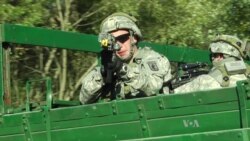Russian President Vladimir Putin’s announcement Tuesday that he intends to add more than 40 intercontinental ballistic missiles to Russia’s nuclear arsenal drew a muted response — but also a subtle warning — from White House officials.
“We’ve seen those reports. I don’t have a specific reaction to them,” White House press secretary Josh Earnest said at Tuesday’s daily briefing.
Putin’s announcement came after Russia condemned U.S. plans to put equipment and troops in Eastern Europe and the Baltic States in the wake of Moscow’s continued involvement in Ukraine. Russia on Monday warned that the U.S. plan could have “dangerous consequences.”
The Russian leader used an arms fair showcasing Russia’s modernized armed forces to deliver his message.
"Our nuclear forces will be supplied with more than 40 new intercontinental ballistic rockets that would be able to overcome an anti-tank defense system, even the most technically advanced ones," Putin said in his opening address at the Army 2015 Expo west of Moscow.
Intercontinental ballistic missiles typically have a range of more than 5,400 kilometers (3,350 miles).
According to the U.S. State Department, Russia currently has 515 deployed intercontinental ballistic missiles, submarine-launched ballistic missiles and heavy bombers, carrying a total of 1,582 nuclear warheads.
Although he did not have a direct reaction to the announcement, Earnest delivered a subtle warning to Moscow, saying the United States would continue to take “steps that we believe are necessary to protect our own security, and our own territory and our own sovereignty.”
Speaking to reporters at NATO headquarters in Brussels, Secretary-General Jens Stoltenberg called Putin's announcement “nuclear saber rattling” that was "destabilizing” and “dangerous.”
Stoltenberg said the Russian threat is the reason the alliance is increasing the readiness of its forces.
NATO’s rapid reaction spearhead force held its first full drills at the Zagan training range in northwestern Poland this week, with thousands of troops from nine NATO countries taking part.
The force was created last year to boost security against NATO’s eastern flank, following Russia’s annexation of the Crimea region from Ukraine.
Russia claims no alternative
Russia's Foreign Ministry commented this week on U.S. plans to put equipment and troops in Eastern Europe and the Baltic States, warning that such moves could provoke a military confrontation with "dangerous consequences."
On Monday, Russia's Interfax news agency quoted senior Russian Defense Ministry official General Yuri Yakubov as saying that the plan, if put into action, would be “the most aggressive step by the Pentagon and NATO since the Cold War of the last century,” and that Russia would have no alternative other than to “build up its forces and means in the western strategic direction.”
On Saturday, The New York Times said that if the deployment plan is approved by U.S. Defense Secretary Ash Carter and President Barack Obama, the U.S. will store fighting vehicles and position as many as 5,000 troops in Bulgaria, Estonia, Latvia, Lithuania, Romania, Poland and possibly Hungary. All seven countries are NATO members.
Watch related video of VOA's Al Pessin
In May, Latvia, Lithuania and Estonia called on NATO to permanently station troops on their territory in order to deter Russia.
Poland said Sunday that the plan would place battle tanks and other equipment on its soil. Defense Minister Tomasz Siemoniak said he discussed the plan with U.S. military officials in Washington last month and was assured a decision would be made soon.
US lawmakers supportive
Meanwhile, U.S. lawmakers from both parties told VOA they supported plans to boost America’s presence in Eastern Europe.
“I agree [with the move]. I visited with the president of Lithuania last August, and I know that they are quite concerned, because of the aggressiveness of Putin along their border, along with the significant Russian population that each of the Baltic states have, particularly Estonia,” said Democratic Senator Bill Nelson. “I think it’s a legitimate concern.”
Republican Senator John McCain also voiced support for the move but said that a U.S. response to Russia’s aggressive posturing should have come much earlier in the form of lethal aid to Ukraine.
“I think it’s a good thing to do, but in the absence of providing defensive weapons to Ukraine, it’s not going to have much effect on Vladimir Putin. What we are doing is a shameful chapter, by not allowing those Ukrainians to get defensive weapons,” he said.
McCain also stressed the U.S. needs to do more to counter Russia’s propaganda offensive, which he said “is intense in all of those same countries [that formerly were under Moscow’s control or influence].”
VOA's Michael Bowman and Jonas Bernstein contributed to this report.






